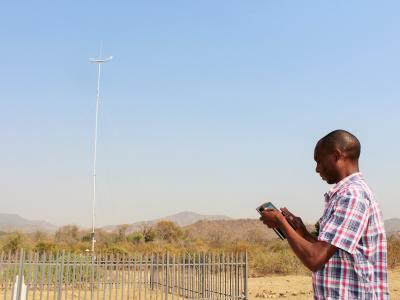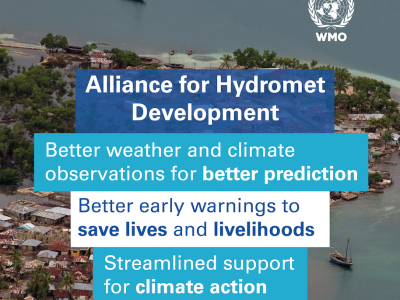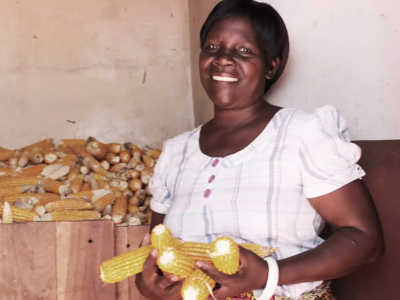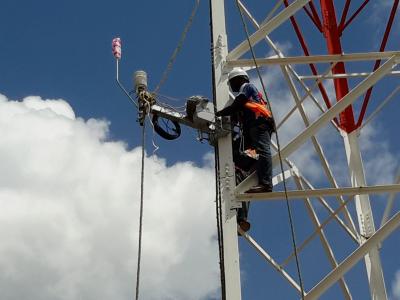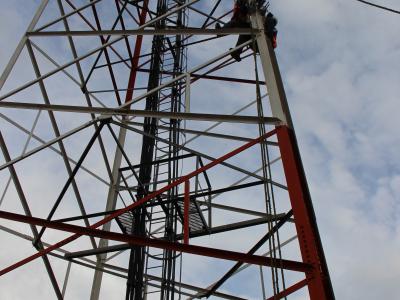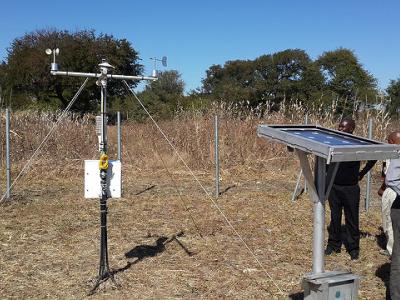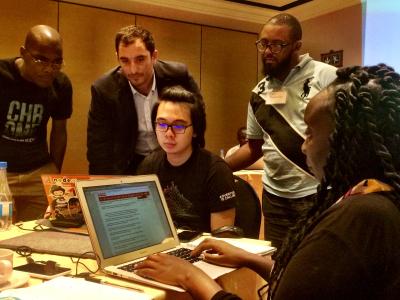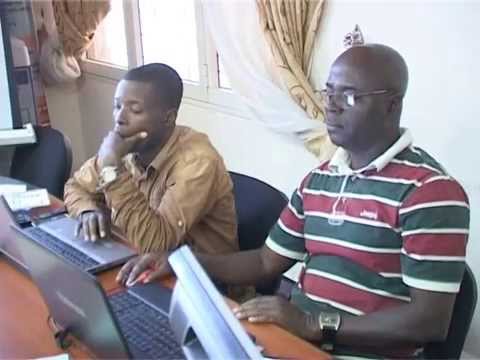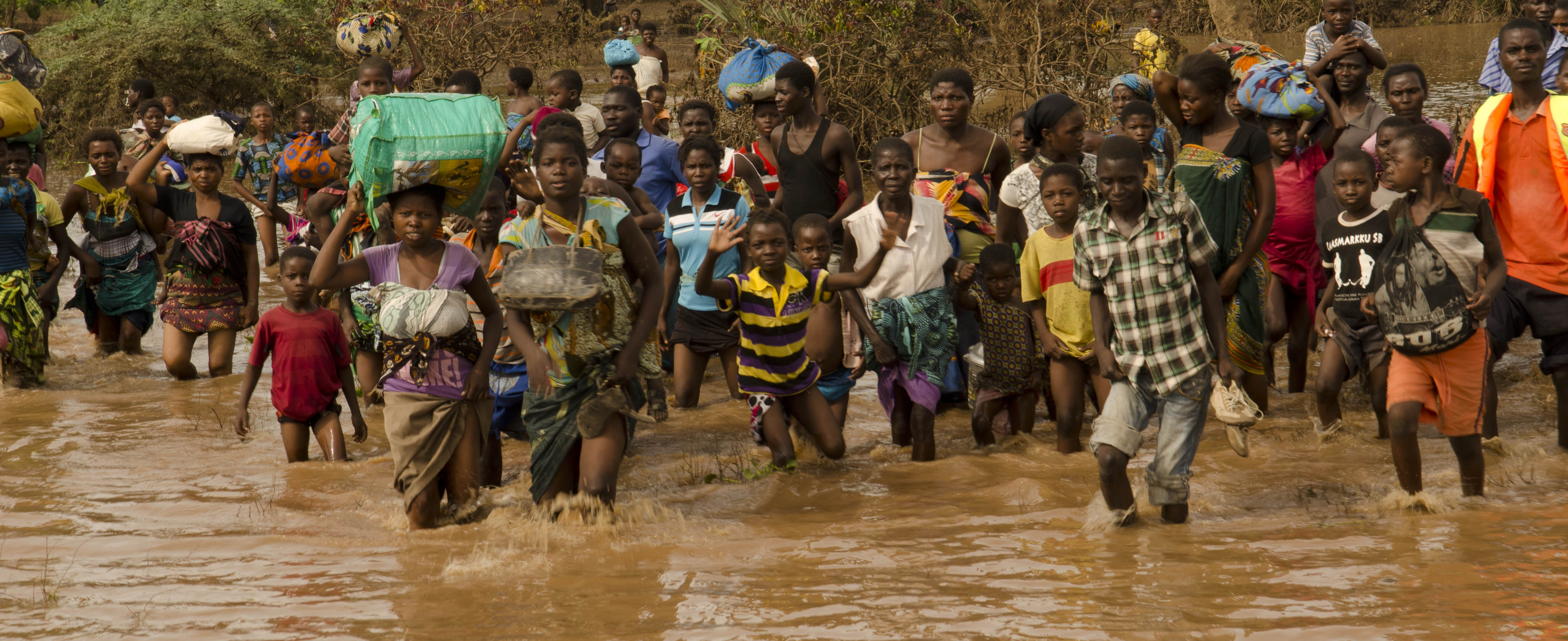
Climate stresses and low adaptive capacity are increasing Africa´s vulnerability to climate change. Climate related shocks to the economy, vulnerable populations, ecosystems and infrastructure threaten development goals and poverty alleviation strategies. The ability of decision-makers to understand and communicate the likely impacts of climate change is of critical importance in adapting development plans to new climate realities. However, the lack of access to reliable climate information and the lack of capacity of disseminating it prove to be significant obstacles in allowing governments and populations to develop the correct tools to address the changes that will be brought on as a result of climate change.
The Programme on Climate Information for Resilient Development in Africa (CIRDA) sought to enable vulnerable countries in Africa (Benin, Burkina Faso, Liberia, Sierra Leone, Sao Tome and Principe, Ethiopia, the Gambia, Uganda, Tanzania, Malawi and Zambia) to strengthen national climate information systems, as well as to benefit from regional coordination and draw upon a platform of knowledge management.
The programme coordinated among different stakeholders needs and capacities in collecting, generating, analysing and disseminating relevant climate information. It also provided capacity-building on: meteorological, climate and hydrological observing and forecasting systems, disaster risk management and viable communication systems/processes for disseminating alerts, and the use of alternative cost-effective technologies. The Programme will provide special consideration on reaching end user populations such as farmers as well as strategies to engage with the private sector as a service provider and as an end user of climate information.
CIRDA Blog
- Regional
- Country Office
- National Governments
- Private Sector Partners
- United Nations Development Programme (UNDP)
- Global Environment Facility (GEF)
The Multi-Country Programme will support the following countries in Africa use climate information as a key tool in long term planning fundamental for economic development.
- Benin
- Burkina Faso
- Ethiopia
- The Gambia
- Liberia
- Malawi
- Sao Tome and Principe
- Sierra Leone
- Tanzania
- Uganda
- Zambia
The Programme will strengthen the capacity of these countries and the region to develop and operate modern climate information and early warning systems by making available technical assistance and provide access to new technologies. Countries will also benefit from regional coordination and a knowledge sharing platform.
For up to date information on the CIRDA Programme and to engage in our ongoing discussions, make sure to check out our blog: http://undp-cirda.blogspot.com/
For a brief snapshot of the Programme, download the CIRDA Fact Sheet.
Bonizella Biagini
 Dr. Bonizella (Boni) Biagini currently manages the UNDP’s Programme on Climate Information for Resilient Development in Africa (CIRDA).
Dr. Bonizella (Boni) Biagini currently manages the UNDP’s Programme on Climate Information for Resilient Development in Africa (CIRDA).
Prior to joining UNDP in 2014, Dr. Biagini worked at the Global Environment Facility (GEF) for 12 years, leading the creation and development of the GEF Adaptation program and project portfolio. She was the senior official responsible for mobilizing resources for the first two dedicated adaptation funds: the Least Developed Country Fund (LDCF) and the Special Climate Change Fund (SCCF), which together have received donor support of $1.5 billion. Before joining the GEF, Dr. Biagini worked at several NGOs including the Climate, Energy and Pollution Program at the World Resources Institute and the international office of Legambiente, a leading Italian environmental research organization.
A physicist by training, Dr. Biagini has worked on climate change and other global environmental issues for 25 years in Europe, the United States, Africa, Asia, and several small island states. In addition to her technical skills, her background encompasses an unusual combination of operational experience on the ground and high-level participation in international environmental meetings including the Earth Summit and the United Nations Framework Convention on Climate Change.
Learn more about Dr. Biagini's work with the GEF Least Developed Countries Fund (LDCF) and the Special Climate Change Fund (SCCF) in the May 2016 publication "Time to Adapt: Insights from the GEF's Experience in Adaptation to Climate Change." Dr. Biagini is also a contributor to the IPCC Third and Fourth Assessment Reports on Impacts, Adaptation and Vulnerability, and the author of numerous publications on climate change science and policy, including the report “Confronting Climate Change, Economic Priorities and Climate Protection in Developing Nations.” (Biagini, 2000). She is the lead author of three recent articles documenting experiences resulting from climate change adaptation projects: “Engaging the Private Sector in Adaptation to Climate Change in Developing Countries” (Biagini, Miller, 2013), “A Typology of Adaptation Actions: A Global Look at Climate Adaptation Actions Financed Through the Global Environment Facility” (Biagini, Bierbaum, Stults, Dobardzic, McNeeley, 2014); and “Technology Transfer for Adaptation” (Biagini, Kuhl, Sims Gallagher, Ortiz, 2014). (Photo Courtesy Margherita Mirabella)
CIRDA Blog
Video Playlist
Livefeed - Climate Action Hackathon - Leveraging Weather and Climate Data to Create Solutions for Adaptation
May 24, 2016, 18:30 (CEST) Bonn, Germany | Post questions on Twitter @unfccc_ccstudio
With obsolete or malfunctioning technologies, dozens of local languages, high-levels of illiteracy, and limited electricity and access to media, many vulnerable communities in Africa do not receive reliable weather reports, and only a few nations possess the ability to issue early warning messages and reach the “last mile.” In response to this challenge, this past March in Zambia the UNDP’s CIRDA Programme launched a Climate Action Hackathon. The event engaged young African developers to create innovative software focused on communicating directly with end users. The livestream of the side event at the May Bonn Climate Change Conference will present a practical demonstration of the innovative solutions that were developed by the hackers to provide weather information for specific end users, including farmers, vulnerable communities and policymakers to inform adaptation actions. The side event will also introduce the results of a Market Study on revenue generating opportunities for weather services in Africa.
CIRDA and CI/EWS Projects In The News
Tanzania: Free Mobile Phones to Boost Awareness On Climate, Weather
All Africa
Wednesday 19 April 2017
The government has embarked on issuance of free mobile phones to local farmers to facilitate direct channeling of information on climate, weather and related disasters to peasants for increased awareness. The initiative has been hatched under the 'Strengthen Climate Information and early Warning System,' the programme that the Disaster Management Department in the Prime Minister's Office (PMO) is executing. Read more
...The Uganda National Meteorological Authority (UNMA) and the United Nations Development Programme (UNDP) have joined hands to strengthen climate information and early-warning systems [in Uganda]. Their initiative would, among other things, detect lightning and inform people to move away from known lighting hotspots... Read More
Procurement Assistance
As part of the CIRDA Programme’s objective to enhance national capacities in monitoring and forecasting extreme weather, hydrology and climate change, UNDP-GEF and UNDP's Procurement Support Office (PSO) have established a collaboration framework under the CIRDA Programme to support partner countries in the procurement of weather, climate and hydrological monitoring infrastructure and new technologies.
Procurement support includes: a) reviewing technical specifications and Terms of Refrence (ToRs) developed by requisitioning units & projects; b) feedback and recommendations pertaining the suitability of technical specifications/requirements to conduct procurement processes; c) market research and sourcing activities to ensure awareness and interest of relevant supplier base; d) review of procurement documents submitted by requisitioning units/projects; e) assistance to Country Offices (COs) & projects with procurement related clarifications during tender processes; f) reviewing submissions to contract review committees and provide recommendations to COs and projects; g) assistance and backstopping support to ensure satisfactory completion of vendor’s contractual obligations and; h) developing managing and maintaining, suitable procurement tools, systems, mechanisms, agreements and contracts to ensure reliable on-going supply chain mechanisms.
In collaboration with CIRDA experts on alternative technologies, the PSO Unit has developed a fact sheet to serve as a support guide to partner countries in their efforts to procure new technologies.
The PSO Unit has also created an online platform with various resources to help country offices and partners. This information is available at the following websites:
UNDP-GEF Procurement Tools & Knowledge Sharing
Long Term Agreements (LTAs) and their corresponding Standard Operation Procedures (SOP)
For any questions please feel free to contact Mettelena Herring at mettelena.herring@undp.org
Climate Data Digitization 
Overview
At the request of the governments of The Gambia, Malawi, Sierra Leone, Tanzania, Uganda and Zambia, the UNDP Programme on Climate Information for Resilient Development in Africa (CIRDA) is taking steps to assist in the preservation of historic climate data in these six African Least Developed Countries.
In its initial phase of support, two experts were commissioned by the CIRDA Programme to meet with National Hydro-Meteorological Services (NHMS) to provide guidance on digitization efforts and create a plan to capture digital records, particularly data used to manage climate impacts on agriculture, fishing and floods. With new training support, three countries are now scaling up efforts to capture historic records and digitize tens of thousands of pages of historic climate archives.
Types of Climate Data
Climate data generally falls into two categories: historical data and data from recent and current observations.
While most people understand the importance of current and recent climate data, fewer appreciate the equal importance of historical climate data. Historical data allow one to establish long-term trends, which in turn helps us understand and better plan for future changes in climate. They also help in developing and refining climate models and seasonal forecasts, as well as provide the foundational datasets used for adaptation studies at local, national and regional scales.
Climate models are mathematical representations of the interactions between the atmosphere, oceans, land surface, ice and the sun. Once a climate model is developed, it has to be tested to find out if it works. And since we can’t wait for 30 years to see if a model is any good or not, the models have to be tested against the past in a process that is called “hindcasting” that rely on historical observations. The simple assumption of hindcasting is that if a model can correctly predict current trends from a starting point somewhere in the past, one can expect it to predict what might happen in the future.
History of Climate Data
Meteorological data observations in most African countries date back to the early 19th Century (for example, in Tanzania the first meteorological observation was made along the coast in 1850). Once recorded on paper, the observations are kept in various formats in data archives usually located at meteorological agency headquarters or even still at the stations where the measurements were originally taken. But this historical data is recorded largely on paper and, depending on the age of the paper and the condition of the archives, some of the data is unreadable or is wearing out at dramatic rates, due to handwritten ink that fades over time.
Initial Needs Assessment
During an initial needs assessment, only Malawi reported having partial access to digitized historic data, with other countries often reporting no central digital archive of these data existing. One reason for this is that historic climate data sets are often held by other agencies aside from the NHMS. Alternative agencies holding historic data sets often include the Ministries of Agriculture, Water, Transport and Education.
Why Digitization is Important
Climate data is an essential ingredient needed to develop weather/climate-based early warning systems and a cornerstone for resilience building efforts. It not only allows us to monitor adverse impacts across development sectors, populations and ecosystems, but it also helps countries to prepare for and adapt to the realities of climate change. This information can be analyzed and applied to protect development gains and aid in the achievement of National Adaptation Plan goals. It is also an essential ingredient in creating more accurate forecasts that can be used to track storms, protect lives and build more resilient livelihoods. Unfortunately, in many parts of sub-Saharan Africa, these important data – often recorded with pen and paper – is being lost at a remarkable rate. Civil War, material decay and the sands of time are literally erasing the historical record of climate in the region.
The Strategy
National digitization strategies depend on a number of factors, including where and how data is stored, legal frameworks, in-house capacity, budgets, and equipment. Generally speaking, and often utilizing external funding, governments electronically capture paper records into a database with the first step being to record digital images of the data using a scanner or digital camera. This ensures that a digital copy of the record is preserved and can be be shared. However, the data itself is not yet in a digital form where it can be used to make calculations or for computational analyses. This requires either manually keying the records into a digital database, using software such as ClimSoft or Excel, or using automatic character recognition software to read, analyze and warehouse the new digital archive. Each variable and data set is important for improved weather forecasting and historical climate tracking, with different variables being used in different applications e.g. wind speed, humidity, temperature and incident radiation all important to calculate evaporation which is used model hydrological flows and crop development. An example of some of the main data useful for climate applications are given below:
Top Level Data Sets 
- Rainfall
- Temperatures
- Wind speed and direction
- Humidity
- Sunshine duration
- Incident solar radiation
- River Discharge
- Salinity
- Surface Water levels
Resources and Further Reading
- Why we need to save Africa’s historical climate data
- Digging For Data
- RFP: Training Support For Data Rescue and Digitization for the Gambia, Zambia and Malawi
- Data Rescue Country Resource Needs Estimates
- Guidelines on Climate Data Rescue - World Meteorological Organization
- Rescue and Digitization of Climate Data by Extraction from ...
- West Africa Climate Data Rescue and Digitization Facility The African ...
- International Environmental Data Rescue Organization - Home Page
- The Quest to Scan Millions of Weather Records - The Atlantic
Images
From top to botton: Historic records in The Gambia, where the archive is not in a good state, but recent records are intact; handheld data recue efforts in Uganda; and the Tanzania Meteorological Department's historic archive.
Programme Outputs
UNDP's CIRDA Programme provides support to 11 vulnerable countries African countries in their efforts to enhance their capacity to collect, analyze and disseminate climate information as a tool in adaptation planning. It does so by providing expert technical advice, promoting regional cooperation efforts, and capacity building.The support provided by the CIRDA Programme is in addition to each countries efforts to implement individual national climate information/early warning projects.
Click below for the project's terminal evaluation and completion reports
Click below to learn about some recent on the ground achievements:
'Towards Sustainability of Climate Information Services' 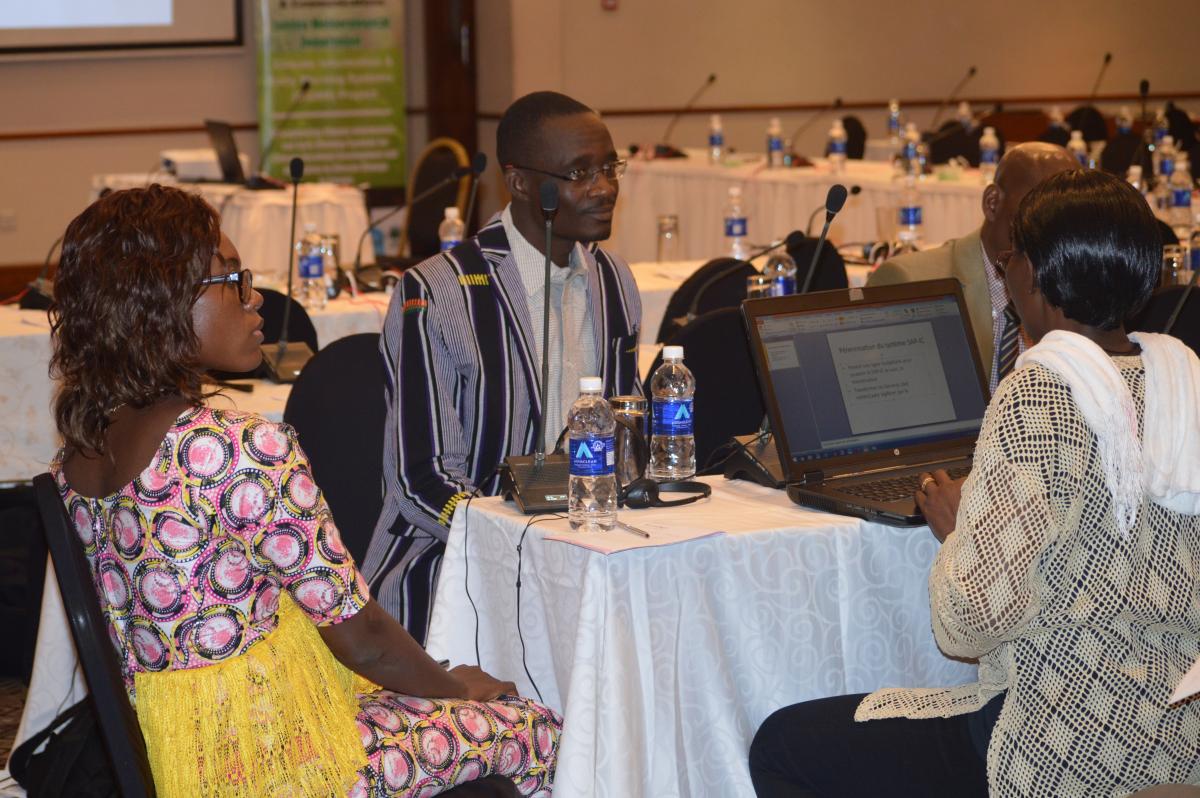
Achievements, Impacts, Lessons Learned and Next Steps for Climate Information Projects
29 November- 1 December, 2017, Lusaka Zambia
Information is power. With improved weather and climate information, nations are able to make climate-smart decisions on everything from agriculture to energy to natural resource conservation while vulnerable communities are be able to protect themselves when bad and unpredictable weather hits. With this in in mind, UNDP been collaborating with countries in strengthening their capacities to collect reliable climate information and to communicate effectively to enhance community and economic resilience to a changing climate. The UNDP Multi Country Programme on Climate Information for Resilient Development in Africa (CIRDA) has been working with 11 African countries for 5 years in meeting this objective by deploying world-leading experts on hydrology, new technologies, meteorology and public-private partnerships and helping national meteorological services establish the networks, partnerships and capacities needed provide climate information in a manner that meets the needs of vulnerable communites and main economic sectors.
This past November, UNDP and the Govenment of Zambia held a regional workshop with representatives from Benin, Burkina Faso, Ethiopia, the Gambia, Liberia, Malawi, Sao Tome and Principe, Sierra Leone, Tanzania, Uganda aa as they begin to develop their plans to ensure long-term sustainability of the investments made in the in the framework of national GEF- LDCF funded projects aimed at strengthening national climate information and early warning systems (SCI/EWS). The workshop focused on the achievements made by each country project including the establishment of national standard operating procedures for early warnings, data rescue of important historical data, expansion of observation networks, enhanced national capacities in forecasting and administrating data and in some cases consolidating weather and climate data and making it available online to help users better assess climate risks. Through discussing achievements and lessons learned, the workshop was able to work with countries to address common concerns and issues as projects move forward with national resources and efforts.
The workshop provided examples of regional and national African networks that have achived a sound level of sustainability such as ASECNA and the Nigerian Meteorological Service (NIMET) and projects that have looked to innovative methods to disseminate climate information for decision making such as PICSA. Participation from the African Development Bank, the World Bank,and UNDP also provided discussion on lessons learned through its various portfolio of projects including a new approach that needs to be taken that goes beyond just investing in equipment but moving towards providing climate information services that are economically sustainable, country appropriate and in turn generate true resilience to climate change.
Workshop Presentations
- UNDP CIRDA Programme - Bonizella Biagini
- Liberia SCI/EWS Project Update
- Zambia SCI/EWS Project Update
- Sierra Leone SCI/EWS Project Update
- Malawi SCI/EWS Project Update
- Introduction to Data Rescue Efforts- Mark Tadross
- IEDRO: Historical Climate Data Rescue and Digitization Efforts in Africa- Martin Mukhondia
- ZMD: Climate Data Rescue in Zambia- Martin Swasa
- Uganda SCI/EWS Project Update
- Ethiopia SCI/EWS Project Update
- Tanzania SCI/EWS Project Update
- PICSA- Graham Clarkson
- Kukua- Penelope Cabot
- Sao Tome and Principe SCI/EWS Project Update
- Benin SCI/EWS Project Update
- Burkina Faso SCI/EWS Project Update
- ASECNA- Mahfoudh Moctar
- NIMET- Sani Abubakar Mashi
- They Hydro in Hydromet- Joost Hoedjes
- Long Term Agreement with BRL for hydro-modeling- Marie Christine Germain
- Lessons Learned African Development Bank- Justus Kabyerma
- Lessons Learned UNDP CIRDA- Bonizella Biagini
Workgroup Activity Results
Group 1: Benin, Burkina Faso, Sao Tome and Principe
Group 2: Malawi, Sierra Leone, Liberia
Group 3: Tanzania, Uganda, Ethiopia, Zambia
Workshop Minutes
‘The Last Mile’
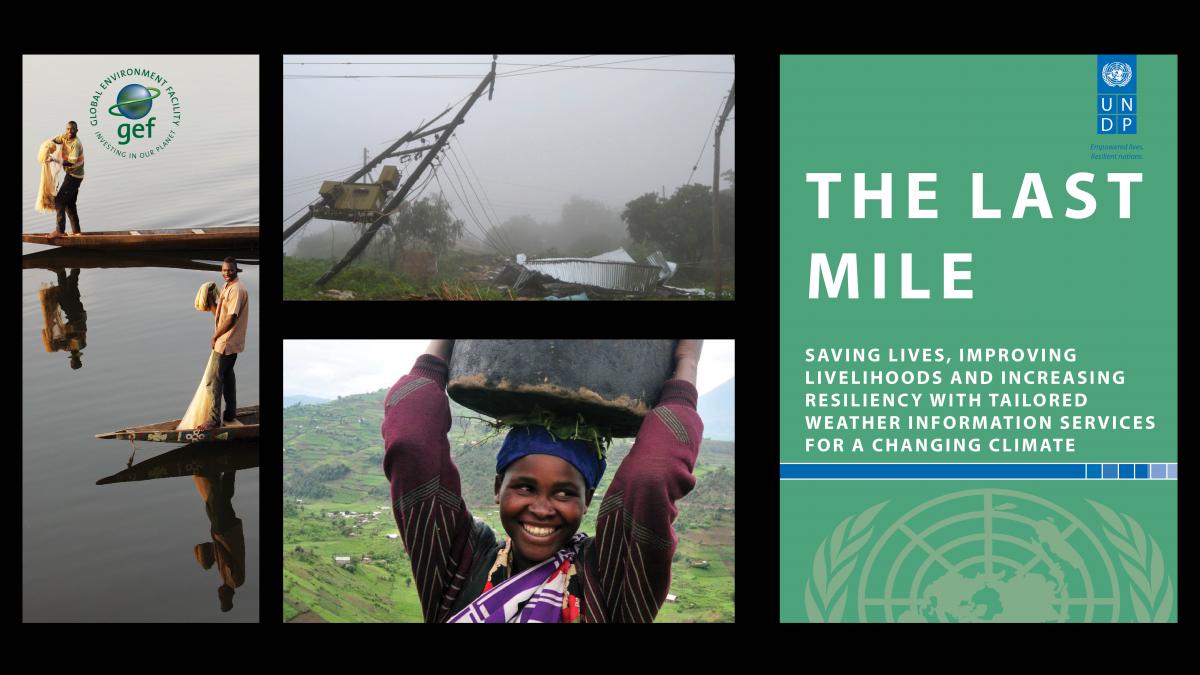
Saving lives, improving livelihoods and increasing resiliency with tailored weather information services
for a changing climate
15-17 March, 2016, Livingstone, Zambia
Climate information and early warning systems can save lives, improve livelihoods and build resiliency across Africa. In order to seize this opportunity, timely, accurate and actionable weather and climate information must be delivered from data collection and creation sources across the “Last Mile” to uninformed and vulnerable end-users.
In this innovation-driven multi-country workshop, experts on cutting-edge technology, communications, public-private partnerships, meteorology and sustainable development will come together to explore new pathways to move from the collection of data to its application, with the end goal of creating actionable recommendations that UNDP-supported climate-information programmes can leverage to impact lives and build sustainability. For this to happen, national weather information services should not only have access to modern weather observation technologies and forecast information, but they must also be able to communicate and apply the content derived from these systems to those in need.
Interactive sessions will cover diverse topics beginning with the sharing of best practices on the application of weather data in the field, followed by sessions and panel discussions that explore important topics that will guide our journey toward the “Last Mile.” These include defining roles and responsibilities of public and private information goods, establishing key partnerships required for the design, development and potential commercialization of “Last Mile” products and services, and developing integrated communications strategies. A notable side event, The Climate Action Hackathon, will also take place in parallel to generate ideas for Last Mile products and services from the application development community and local media.
Ample time will be provided for interactive discussion between project managers, implementing agency officials and the Last Mile application development community in order to more deeply explore the development of workshop ideas within each national project.
Main Goals
- Understand challenges and opportunities for UNDP-supported Climate Information and Early Warning Systems projects as we journey toward the last mile
- Share best practices, innovative technologies and cutting-edge methodologies
- Define actionable recommendations to cover the “Last Mile”
- Build relationships and partnerships
- Ensure long-term sustainability
- Embrace innovation
- Connect, listen, explore
Resources
- Communications Toolkit
- Communications Strategy Template
- Press Release - UNDP Last Mile Workshop in Livingstone to Strengthen Climate Information Systems Across 11 Sub-Saharan African Nations
- Climate and Weather Services Market Assessment - Revenue Generating Opportunities Through Tailored Weather Information Products
Presentations - Day 1
- Bonizella Biagini - The Last Mile
- Anthony Mills - Defining the Last Mile
- Pradeep Kurukulasuriya - Adaptation
- John Snow - Opening Remarks
- Greg Benchwick - Integrated Communications Strategies
- Kunda Mwila - CI/EWS Communications Strategy in Zambia
- Arnaud Zannou - Standard Operating Procedure in Benin
- Caelainn Barr - Innovating How We Report on Climate Change
- Joost Hoedjes - Geonetcast
- Edson Nkonde - Last Mile Building Blocks ZMD
- Ari Davidov - Earth Networks
- Cristoph Neudhart - Ubimet
- Andrew Kruczkiewicz - ENACTS
Presentations - Day 2
- David McAfee - Last Mile Application Development and Distribution
- Hanneke Schuurmans - Flash Flood Forecasting App
- Anthony Mills - Main Findings of the CIRDA Market Assessment
- Robert Kintu - The Commercial Market Opportunity of Weather and Climate Services in Africa
- Stewart Collis - aWhere 'The Power of Agriculture Intelligence'
- Alan Miller - Building the Last Mile with Public-Private Partnerships
- Beniah Nyakanda - EcoNet's Experiences in Implementing Weather Indexed Insurance in Zimbabwe
- Alfei Daniel and Pascal Okello - Lessons Learned from Visit to the Phillippines
- Sharon Onyango - ACRE Africa
- Jeanne Coulibaly - Lessons Learned From the GFCS On Disseminating CIS to Smallholder Farmers in Malawi and Tanzania
- Babatunde Abidoye - UNDP Impact Evaluation Baseline Survey
- Burkina Faso - Last Mile Service Target and Messages
Country Presentations
Mobile APP
Climate Action Hackathon
Big Ideas, Visionaries, Amateur Forecasters and Computer Developers Welcome at UNDP Climate Information for a Resilient Africa Event. Learn More
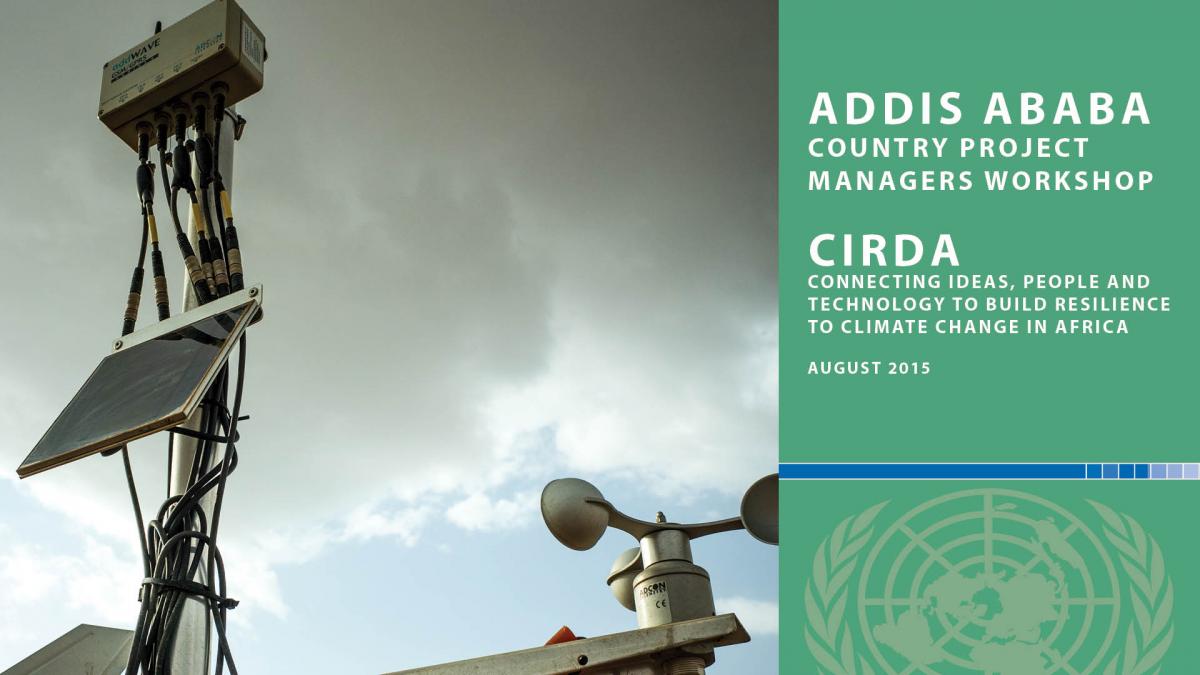 25-27 August, 2015, Addis Ababa, Ethiopia
25-27 August, 2015, Addis Ababa, Ethiopia 
UNDP CIRDA Country Project Managers Workshop
This workshop hosted by the UNDP’s Programme on Climate Information for Resilient Development in Africa (CIRDA) brings together country project managers, technical advisories, meteorologists and hydrologists, and experts on public-private partnerships, communications and development to explore innovative approaches and new technologies to strengthen and sustain climate information and early warning systems in Africa.
The meeting offers an opportunity for collaboration and knowledge sharing between in-country leadership teams from 11 African nations. Sessions focus on technical support mission planning, reports from the Strengthening National Climate Information/Early Warning System (CI/EWS) Projects, public-private partnership market studies, support for the procurement of Hydro-Meteorological technology, and covering the “Last Mile.”
Unique country clinics bring country project managers together with experts from the CIRDA Programme to discuss innovative climate and weather information
technologies, new approaches and cutting-edge applications of climate data.
The meeting is hosted at the UNDP Regional Service Center for Africa (RSC). Powerpoint presentations and videos from the event will be shared on this page as they become available.
Links
Presentations
Introductions, Meeting Goals and Strategies
- Bonizella Biagini High-Level Introduction
- John Snow Introduction - Framing Workshop Goals
- Anthony Mills - Market Study on Public-Private Partnerships
- John Snow - Procurement Plans and Strategies
- Procurement Support Unit
- Zambia LTA Experience
- Anthony Mills - The Last Mile
Reports from Strengthening National Climate Information/ Early Warning System (CI/EWS) Projects
Day 1
Day 2
Videos
3 March, 2015, Kampala, Uganda- Workshop on Creating Value Added Weather and Climate Services through Innovative Public Private Partnerships
The UNDP-CIRDA Programme and the Government of Uganda held a training workshop at the Golf Course Hotel in Kampala aimed at building sustainable climate change adaptation and economic development plans. The workshop will support National Hydrological and Meteorological Services (NHMS) in Africa create value added weather and climate services by engaging with the private sector and developing innovative public private partnerships.
The workshop brought together government representatives, the private sector, international experts, representatives from the World Meteorological Organization (WMO) and UNDP. Discussions were held with representatives from agriculture, financial, aviation and telecommunication sectors on how to meet their needs and best engage them through the use of new technologies to communicate timely and reliable climate information to support national development.
Long term financial sustainability of national weather and climate services was a key topic addressed during this two day event. As governments deal with budget constraints on many fronts, limited budget resources are a challenge for NHMS in their attempts meet the information needs of local populations. Conversations were centered on analyzing the potential for generating revenue to support the sustainability of weather and climate services, including opportunities for collaboration with mobile phone companies and establishing succesful public private partnerships. These discussions led to the development of country action plans to provide a pathway forward in CIRDA's 11 partner countries.
Action Plans
- Benin
- Burkina Faso
- Ethiopia
- the Gambia
- Liberia
- Malawi
- Sao Tome and Principe
- Sierra Leone
- Tanzania
- Uganda
- Zambia
Presentations:
Day 1
- CIRDA Overview, Bonizella Biagini
- Looking Back: Innovative Technologies, Jeremy Usher
- Looking Forward: Phillippines Case Study, Sebastian Glink
- Looking Forward: Technologies as a Foundation to PPPs, Alan Miller
- Commercialization of Weather and Climate Services- South Africa, Ziyanda Majokweni
- Commercialization of Weather and Climate Services- KNMI, Menno Bom
- Commercialization of Weather and Climate Services- Uganda, Michael Nkalubo
- Using PPPs in NHMS, Philippines- Sebastian Glink
- Using PPPs to Accelerate NHMS Commercialization Efforts - Ari Davidov
- Catalyzing private sector investment- Anthony Mills
Day 2
- Partnering with Mobile Telephone Companies: Telcel Faso- Moumouni Sawadogo
- Partnering with Mobile Telephone Companies from a Regulatory Point of View: Uganda Communications Comisssion- Patrick Mwesigwa
- Partnering with Mobile Telephone Companies: Vodafone Global- David Kuguru
- 3-2-1 Service: Human Network International- David McAfee
- Uganda Charter Health Net- Patrick Kibaya
- TAHMO's Sister School Programme- Zach Dunn
- Innovative Initiatives using Mobile Platforms- David Kuguru
- Aviation and Transport Perspective: ASECNA- Moise Betole Ada
- Aviation and Transport Perspective: BPS- Nick Grenfell
- Aviaton and Transport: South African Airways- Willie Saayman
- Banking Perspective: Stanbic Bank- Mwamba Musambo
- Insurance and Banking Opportunities to Engage: ClimateWise- Katharine Thoday
CIRDA Partner Country Presentations
14 October, 2014, Dar es Salaam, Tanzania- Workshop on a Systems Approach to Designing, Implementing, and Utilizing Observing Networks
UNDP’s Multi Country Support Programme to Strengthen Climate Information and Resilience Development in Africa (CIRDA), in close collaboration with the UNDP Country Office in Tanzania, held a training workshop on a Systems Approach to Designing, Implementing, and Utilizing Observing Networks from 14 to16 October, 2014, at the Hotel White Sands in Dar es Salaam, Tanzania.
The workshop provided training to Directors of the National Meteorology and Hydrology Services (NHMS), Directors of the NHMS Observation Networks, CIRDA country managers, and other interested CIRDA partners, by introducing a systems approach to the design, implementation, and utilization of observing networks. Training sessions were led by international professionals in the fields of meteorology, surface observations, data quality, private sector engagement, and climate technologies. The event also provided an opportunity for country representatves to present their progress on implementing local and national early warning systems (EWS) with the support of the Programme. The workshop discussion resulted in the development of country posters that detailed national observing networks.
Click here for the agenda workshop
Links to Presentations:
- Introduction to CIRDA- Bonizella Biagini
- Importance of Data from Observing Networks in a World Undergoing Climate Change- Jeremy Usher
- Importance of Data from Observing Networks in a World Undergoing Climate Change: Business Case Approach- Alan Miller
- Benefits of Partnering with the Private Sector: Success Stories in Building Infrastructures- John Doherty (Earth Networks)
- Importance of Data from Observing Network: Partnering with Telecommunication Companies- Njaliwe Banda (Access)
- The Importance of Weather and Climate Data: ACRE’s Agricultural Insurance Perspective- Wairimu Muthike (ACRE)
- Introduction to Systems Approach and Backwards Planning- John Snow
- Data Quality Assurance and Control Methods for Weather Observing Networks- Cindy Luttrell
- Instruments, Maintenance, Calibration- Scott Richardson
- Novel Observing Approaches: New and Emerging Technologies- John Snow
- Expansion of Observation Networks in East Africa: Challenges and Opportunities- David Mburu
- Trans-African Hydro Meteorological Observatory: Creating African Climate Synergy- John Selker (TAHMO)
Click here for a fact sheet on Sao Tome and Principe's EWS
Country posters detailing national observing networks
20 May, 2014, Nairobi, Kenya- Roundtable on Strengthening Development of Weather, Climate and Hydrology related Early Warning Systems in Africa
Development banks, intergovernmental agencies and meteorological services working in Africa to support the development of climate information and early warning systems across Africa met in Nairobi to communicate and raise awareness of ongoing and planned iniatives. This event is an example of the ongoing coordination between programmes and agencies to assure that all iniatives are in keeping with development and adaptation needs. Discussions served to highlight the complementary nature of regional activities directed at enhancing climate information systems.
CIRDA Programme Manager, Bonizella Biagini, presented the aims, objectives, actions and scope of the CIRDA Programme.
Presentations were also made by representatives from UNESCO, WMO, AFDB, Kenya's Metorological Service, ICPAC, NDMA, UNEP and the UN's International System for Disaster Reduction.
- UNESCO
- WMO
- African Development Bank (AFDB)
- Kenya Met
- ICPAC
- NDMA
- UN- International System for Disaster Reduction
- UNEP
- CCAFS
- BBC Media Action
For a full summary of the event, click here.
13 April, 2014, Addis Ababa, Ethiopia- Launch of the Multi Country Support Programme to Strengthen Climate Information Systems in Africa
Representatives from UNDP's GEF Unit met in Ethiopia on April 13-14 with high level representatives from Benin, Liberia, Malawi, Sierra Leone, Sao Tome and Principe, Tanzania, Uganda and Zambia to launch the Multi Country Support Programme to Strengthen Climate Information Systems in Africa. The Honorable Ministers of Environment from Uganda, Sao Tome and Principe as well as the Executive Chairperson of the Environment Protection Agency of Sierra Leone were present to celebrate the Programme's onset.
As a highlight to the workshop, an Expo with 13 meteorological companies and service providers was held to introduce government representatives to the cutting edge technologies available in the collection, processing and dissemination of climate information.
Links to Presentations
- Presentation 1. Pradeep Kurukulasuriya
- Presentation 2. Carolin Richter
- Presentation 3. Bonizella Biagini
- Presentation 4. Mostomi Maletjane
- Presentation 5. Margaret Mukahanana
- Presentation 6. Ermira Fida
- Presentation 7. John Snow
- Presentation 8. Mamadou Lamine Bah
- Presentation 9. Christopher Oludhe
- Presentation 10. Koumé Guy Marcel Bouafou
- Presentation 11. Getachew Abate
- Presentation 12. Alan Miller
- Presentation 13. Patrick Karani
- Presentation 14. Julie Arrighi
Implementation of the CIRDA Programme is carried out under the general guidance of a Project Board composed of senior-level representatives from UNDP-GEF, WMO, UN-SPIDER, and representatives from 3 UNDP Country Offices.
The Project Board is the strategic decision-making body of the project, providing overall guidance and direction to the CIRDA Programme Manager.
IV Board Meeting 2018
A CIRDA Project Board Meeting was held 22 February 2018.
Click here for Board Presentations
III Board Meeting- 2016/17
A CIRDA Project Board Meeting was held in 16 February, 2017. The meeting presented the 2017 AWP as well as the Programme's milestones for 2016.
Click here for Board Meeting Minutes
Click here for Board Meeting Presentation
Click here for UNDP CIRDA 2016 Milestones
II Board Meeting- 2015
A CIRDA Project Board Meeting was held in Kampala, Uganda on March 5, 2015. The meeting was held to present the Programme's 2015 Annual Work Plan and Budget, both were approved by all board members.
Click here for Board Meeting Minutes
Click here for the Board Meeting Presentation
I Board Meeting- 2014
The first Project Board Meeting was held on July 8, 2014. The meeting's objective was the presentation of CIRDA's Annual Work Plan and Budget, both which were unanimously approved.
Click Here for the Board Meeting Minutes
Click Here for the Board Meeting Presentation
Click here for the project's terminal evaluation and completion report
- UNDP-GEFBonizella BiaginiProgramme Manager
- UNDP-GEFMontserrat Xilotl

